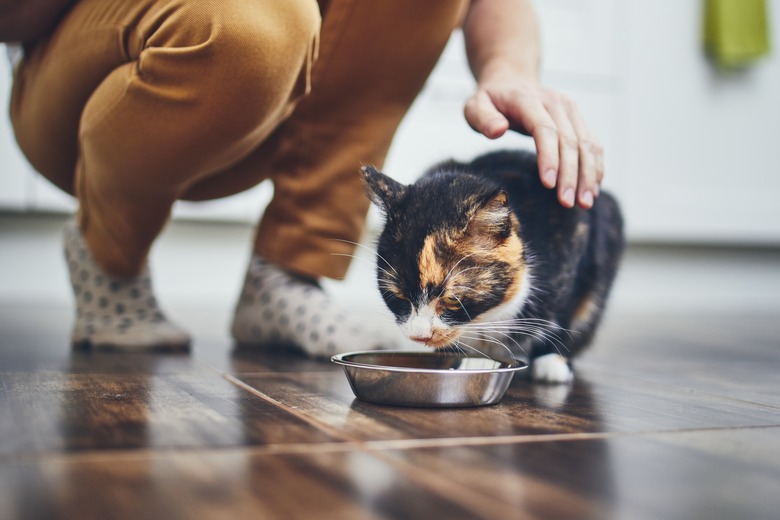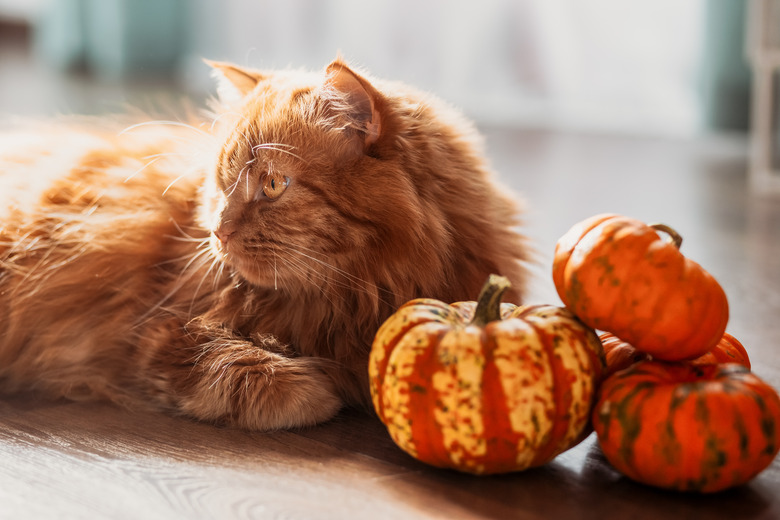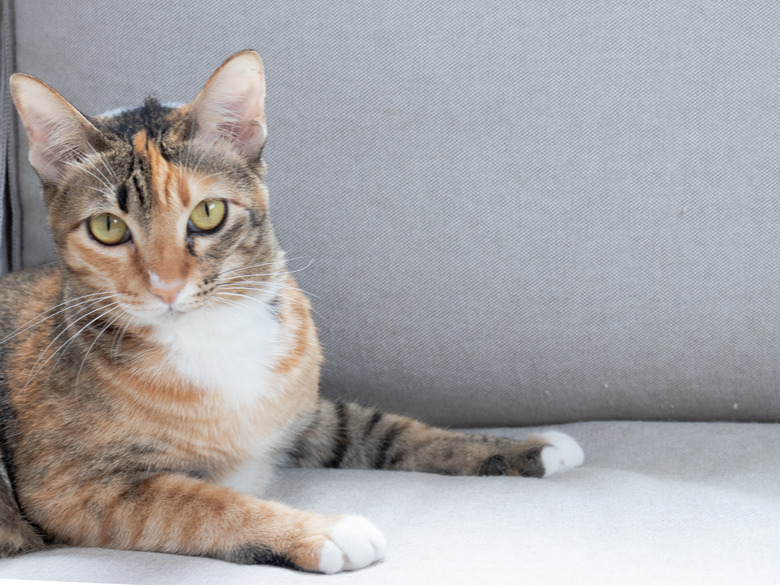Cat Fiber — How To Add Extra Fiber For Cats To Their Food
There are a number of reasons you might want to add fiber to your cat's diet. If your cat is having difficulty defecating and you're finding an empty litter box day after day, fiber can help move things along. Obese kitties can also benefit from more fiber in their diet to help them feel more satisfied with fewer calories, which can help your weight loss goals for your cat.
Different fiber types
Different fiber types
There are two different types of fiber, which act very differently in the digestive tract. Adding them without consulting your veterinarian can upset your pet's digestion and digestive system significantly.
Soluble fiber dissolves in water, which means it absorbs water in the stomach and intestines. This creates a gel that will make your cat feel full and slow digestion. Insoluble fiber doesn't absorb water and goes through the small intestine without breaking down. It bulks up and adds moisture to the stool, helping foods pass through more easily.
How much fiber a cat should get
How much fiber a cat should get
All pet food labels include the total amount of fiber. Unlike human food that consists of the words "total dietary fiber," pet food uses the words "crude fiber," which is the insoluble fiber type, as a measure of its fiber content. The difference is that human food breaks down the ingredients into two types: soluble and insoluble.
Since pet chow's guaranteed analysis includes only "crude fiber," your pet's food could contain more fiber than you think due to any insoluble fiber in its ingredients. Too much fiber in the diet isn't good for a cat. The feline intestinal tract is short, making it well suited to a carnivorous diet and limiting its ability to ferment fiber.
Overabundant fiber decreases your cat's ability to digest other essential nutrients. A cat's diet shouldn't contain more than 10 percent fiber.
Is pumpkin a good source of fiber for cats?
Is pumpkin a good source of fiber for cats?
A web search of good fiber sources for cats is bound to yield a plethora of articles recommending pumpkin. The answer to whether it's a good source, however, is a bit more complicated than that.
Plain pumpkin, which shouldn't be confused for pie filling, is fine for temporary diarrhea and temporary constipation. Check the label to make sure the only ingredient is pumpkin to be sure that it doesn't contain sodium, added carbohydrates like sugar, or other ingredients that aren't good for your cat and could cause additional gastrointestinal issues. For pets who have chronic gastrointestinal issues, skip the pumpkin and get a high-quality therapeutic food that your veterinarian recommends.
What to do if you suspect your cat is irregular or constipated
What to do if you suspect your cat is irregular or constipated
The best way to add enough fiber to your pet's diet is by heeding the advice and recommendations of your veterinarian. If your cat is overweight, your veterinarian will likely recommend a ready-made, high-quality diet that is specifically formulated for cats who need to manage obesity.
Additionally, even though fad diets like fasting are popular with humans, it's not good for pet health. A sudden decrease in caloric intake, even for just a few days, can cause a dangerous condition called hepatic lipidosis. Overweight cats are more likely to develop this.
Your veterinarian will examine your cat to make sure that fiber is what is needed. Especially in the case of constipation, your cat could be experiencing trouble for myriad other reasons, such as:
- Dehydration, including from underlying kidney disease
- Inappropriate diet
- Injury
- Reaction to medication
- Megacolon, which is an abnormal dilation of the colon
- Physiological problems, such as tumors
- Neurological disease
- Metabolic abnormality
Fiber supplements for cats
Fiber supplements for cats
If constipation is the reason you're considering adding more fiber to your cat's diet, there are other things you can try while you're waiting for the veterinarian appointment. Dehydration is a leading cause of constipation in cats. They evolved to eat a strictly carnivorous diet, which delivers a moisture content of 75 percent or more.
This can be an issue for adult cats, particularly older cats who might have chronic kidney disease, a disorder that can make them more prone to becoming constipated. Despite the fact that these cats drink a lot of water, they're also losing a lot of water as well due to their kidneys not functioning normally. As a result, they are chronically dehydrated.
Dry kibble delivers just 5 to 10 percent moisture, and cats don't make up the difference at the water bowl. Though there are some outliers who love dripping faucets and water fountains, many cats don't have a high thirst drive, and those on dry kibble tend to consume less than half the moisture of those on canned food.
Also, cats are obligate carnivores. Their systems aren't designed to eat the high-fiber that dry cat food delivers from sources like potatoes, legumes, and grains. Instead, they get their nutrition solely from hunting prey. Talk with your veterinarian before trying a grain-free to help improve any GI tract issues. Currently, there is no data to support the health claims of grain-free foods for pets.
A cat's natural diet consists of less than 0.55 percent fiber. Partially digested food from their prey's stomach, bones, hairballs, and fur make up what little fiber a cat would naturally ingest. This makes it essential to consult your veterinarian before adding fiber to your cat's diet.
The bottom line
The bottom line
There are many conditions that can lead to your cat being irregular or constipated, so it's important that you always check in with your DVM to find out the underlying cause. One common cause of constipation is dehydration in cats, often due to a reliance on dry cat food that doesn't offer your cat enough water. Switching to a wet food or a veterinarian-prescribed dry food might do the trick. Always remember that cats aren't meant to eat an overly high-fiber diet, so pet owners should look for other solutions that might be closer to what their cat needs.


